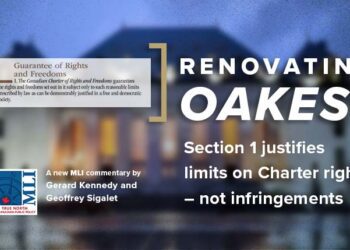***NOTE*** You can watch a replay of this debate on CPAC, Saturday, June 22 2013 at 10:00 am ET and again on Sunday June 23 at 6:00 pm ET. Visit www.cpac.ca for channel listings. ***
The sovereignty debate to end them all…
Though the two historic antagonists, Pierre Trudeau and René Lévesque, have long left the scene, the uncertainties raised by the prospect of a Quebec vote for secession haunt us still.
In April, historian Frédéric Bastien summoned these ghosts from the past by declaring in his essay, La bataille de Londres, that the patriation of the Constitution in 1982 was “a coup d’état.” It is true that no Quebec premier, from René Lévesque to Pauline Marois, from Robert Bourassa to Jean Charest, has ever agreed to put his or her signature to the 1982 Constitution Act.
On April 16, Quebec’s National Assembly adopted unanimously the following motion, inspired by Frédéric Bastien’s book: “The National Assembly asks the Government of Canada to provide access to all information contained in its archives and demands that the full light of day be cast on the events that led to the proclamation of the Constitution Act, 1982.”
So a mystery remains. Confusion and contradictory convictions still thrive, within Quebec and across Canada, about the rights and wrongs of secession. All agree that Quebec’s secession, should it come about, would carry portentous consequences for all current Canadians and for the future Québécois. And yet, though no national issue has ever been so passionately argued, proposed, opposed, and, even 37 years after the election of the first sovereignist Parti Québécois government, despite two Quebec referendums on secession, despite the reference to the Supreme Court of Canada and the enactment of two contradictory bills – Stéphane Dion’s Clarity Act, and Lucien Bouchard’s Act respecting the exercise of the fundamental rights and prerogatives of the Québec people and the Québec State – still, in the minds of the citizens darkness remains.
Can we resolve at last, once and for all, this national enigma? The Macdonald-Laurier Institute presumes to wager that it can be done. To this purpose, it has invited two eminent public personalities, both eloquent, both recognized for their idealism and their sincerity, both combining outstanding academic qualifications with unusual political experience, to debate the following proposition:
“Resolved: The Government of Québec can decide unilaterally on secession from Canada”
Who are these men who will illuminate the path where angels fear to tread? Can they reveal the terms that could deliver justice for all?
Defending the proposition that Quebec can secede unilaterally will be Université de Montréal law Professor Daniel Turp. He obtained his first degree in law from the University of Sherbrooke, his master’s degree from the University of Montreal and his Ph.D. from Paris’s Université Pantheon-Assas, recognized as France’s top law faculty.
Besides being invited as a visiting professor to several prestigious universities, including the University of Paris and Harvard University, Professor Turp was elected to the Parliament of Canada as a member of the Bloc Québécois and later elected to Quebec’s National Assembly as a member of the Parti Québécois. He has written extensively defending Quebec’s right to secede.
Opposing the proposal that Quebec can secede unilaterally will be former Liberal Party leader Stéphane Dion, who obtained B.A. and M.A. degrees in political science at Université Laval, then a Ph.D. in sociology at the Institut d’Études Politiques de Paris. He also taught at the Université de Montréal and, memorably, entered the federal cabinet in 1996 to rescue Canada after the close call of the 1995 referendum. His political career is part of our history.
Come one, come all. Bring with you your doubts, your convictions, your passions. Are there lessons to be drawn from Quebec’s previous referendums in 1980 and 1995? Is there something to be learned from the referendum process planned for next year in Scotland? Can secession in Canada be brought about consensually? Does the rule of law apply? Is the Clarity Act a federal intrusion into Quebec’s jurisdiction? Do the rights of aboriginals and of Canadians generally confront the rights of Quebecers?
Two outstanding proponents will face each other in Canada’s greatest national controversy. The idea originated with the co-sponsor of the event, the Special Committee on Canadian Unity, who turned to the reputed Macdonald-Laurier Institute actually to organize the debate and ensure that it was conducted fairly, impartially, for both sides. At last, let there be light!
The debate will be held on June 20, 2013, at 7 pm at the Canadian War Museum in Ottawa.
Tickets available at: https://macdonaldlaurier.ca/the-government-of-quebec-can-decide-unilaterally-on-secession-from-canada/
The Macdonald-Laurier Institute is the only non-partisan, independent national public policy think tank in Ottawa focusing on the full range of issues that fall under the jurisdiction of the federal government.




